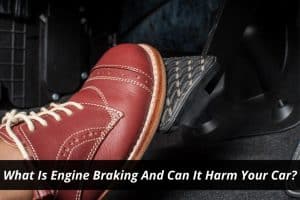What Is Engine Braking and Can It Harm Your Car?
Engine braking is a technique that drivers use to slow their cars down without using the brake pedal. This technique relies on the engine’s ability to create drag, which slows the car down. While this technique can be helpful when you need to slow down quickly, it can also harm your car’s engine and transmission. In this blog post, we’ll explain what engine braking is and discuss how it can damage your car. We’ll also offer tips for avoiding these problems. Thanks for reading!
What engine brake is and how does it work?
Engine braking is a technique used to slow a vehicle by taking advantage of the engine’s inherent tendency to run at lower speeds when unloaded. The most common form of engine braking occurs when the driver shifts into a lower gear, causing the engine to run at a higher speed than the wheels. This increases the resistance of the engine, which in turn slows the vehicle.
Engine brake can also be achieved by closing the throttle, which reduces the amount of fuel and air entering the engine and therefore its power output. When used correctly, engine braking can be an effective way to slow a vehicle without wearing out the brakes. However, it should not be used excessively, as this can cause damage to the engine.
Braking the engine is most commonly used when descending a steep hill, as it can help to control the speed of the vehicle and prevent the brakes from overheating. It can also be useful in stop-and-go traffic, as it can help to keep the vehicle at a consistent speed and reduce wear on the brakes.
When using the engine brake, it is important to pay attention to the engine temperature gauge and make sure that the engine does not overheat. If the engine temperature gets too high, it could seize up, causing serious damage. In general, engine braking should be used sparingly and only when necessary.
It is not meant to be used as a way to save fuel, as doing so will actually use more fuel in the long run. If you are not comfortable with using engine braking, it is best to avoid it altogether. It is always better to err on the side of caution when it comes to your vehicle.
Engine braking can be a useful tool if used correctly, but it is not something that should be done lightly. If you are unsure about how to use it, or if you think there is a possibility that you could damage your engine, it is best to avoid using it altogether.
The benefits of the engine brake
When it comes to slowing down or stopping your car, there are two main braking methods: friction braking and engine braking. Friction braking is the most common, and it refers to using the brakes to create friction in order to slow down or stop the vehicle. Engine brake, on the other hand, relies on the engine to help slow down the car. So, what are the benefits of engine braking? Let’s take a look:
1. Prolong the life of your brakes
one of the main benefits of engine brakes is that they can help prolong the life of your brakes. This is because when you use your brakes to slow down, the brake pads and other components experience a lot of wear and tear.
Over time, this can lead to damage and reduced effectiveness. However, with engine brakes, the engine does most of the work, which means that your brakes don’t have to work as hard. This can help them last longer.
2. More efficient than friction braking
Another benefit of engine brake is that it’s more efficient than friction braking. When you use your brakes to slow down, a lot of energy is lost as heat. However, with an engine brake, that energy is used to slow down the car, which makes it more efficient.
3. More control over your car
Another benefit of engine brakes is that they can give you more control over your car. When you’re using your brakes to slow down, there’s a risk of skidding or losing control. However, with engine braking, you have more control over the car and can slow down more smoothly.
4. Can be used in combination with friction braking for optimal results
Finally, the engine brake can be used in combination with friction braking for optimal results. If you’re coming to a stop and need to brake quickly, using both methods at the same time can help you stop more quickly and safely.
Engine brake has a number of benefits that make them a great choice for slowing down or stopping your car. If you’re looking for a more efficient and smoother way to the brake, engine braking is the way to go.
How to use engine braking safely
When you drive a car with an automatic transmission, you may notice that the car will automatically downshift when you slow down. This is called engine braking, and it’s a great way to save your brakes and extend their life. However, there are some safety concerns that come with using an engine brake. Here are a few tips on how to use engine brake safely:
– Use the engine brake when you are going downhill. When you use engine braking on a level surface, it can put stress on your transmission.
– Don’t rely on engine braking to stop your car. If you need to stop quickly, use your brakes. Engine brakes can take longer to stop the car, so it’s not ideal for emergency stops.
– Be aware of your surroundings. If you’re engine brakes in a built-up area, be extra cautious of pedestrians and other vehicles. Engine brakes can be noisy, so people may not hear you coming.
When not to use the engine brake
Overall, an engine brake is a great way to save your brakes and extend their life. Just use caution when you’re using it and be aware of your surroundings.
Using an engine brake is a great way to slow your vehicle down without having to use your brakes. However, there are some situations when you should avoid using engine braking.
One situation where you should avoid engine braking is on wet or slippery roads. When the road surface is wet, your tires can have a hard time gripping the road. This can cause your vehicle to slide or skid, and engine braking can make these problems worse.
Another situation to avoid using an engine brake is when you’re following another vehicle closely. If you’re tailgating someone and they suddenly brake hard, you may not be able to stop in time if you’re relying on the engine brake alone. So, while engine brake can be a useful tool, be sure to use it judiciously.
Potential dangers of using engine braking incorrectly
While engine brakes can be a useful tool in some situations, they can also be dangerous if used incorrectly. When coming to a stop, for example, using too much engine braking can cause the wheels to lock up and skid, leading to a loss of control of the vehicle.
Additionally, using engine brakes on slippery roads can also lead to a loss of traction and an increased risk of sliding or losing control of the vehicle. If you must use engine braking, be sure to do so carefully and only when absolutely necessary. And always keep an eye on your speed and situation so that you can react appropriately if something goes wrong.



